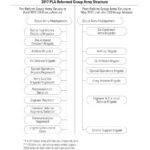The United States Air Force has a history of evolving its uniforms to meet the needs of its Airmen and the changing operational landscape. Over the past decade and a half, significant shifts have occurred, marking a departure from the familiar Battle Dress Uniform (BDU) with its woodland camouflage, which served Airmen for approximately 30 years.
A key moment in this evolution was October 2, 2007, when Basic Military Training at Lackland Air Force Base in Texas began issuing the Airman Battle Uniform (ABU) to trainees. This uniform became a staple for Airmen until April 1, 2018, when the transition to the Operational Camouflage Pattern (OCP), a uniform shared with the U.S. Army, officially began, signaling the eventual phasing out of the ABU.
With the Airman Battle Uniform no longer authorized for regular wear, many Airmen have faced the question of what to do with their previously issued ABUs. While some may have discarded them or repurposed them for work around the house, and others have stored them away, Senior Airman Michael A. Sanchez, from the 908th Airlift Wing’s 25th Aerial Port Squadron, found a meaningful solution: collecting and donating them to the Civil Air Patrol (CAP).
The Civil Air Patrol, a congressionally-chartered, federally-supported non-profit corporation, plays a vital role in developing “youth into dynamic Americans and aerospace leaders.” As the official civilian auxiliary of the United States Air Force, CAP volunteers provide crucial community support through search and rescue missions, disaster relief efforts, humanitarian services, and comprehensive aerospace education programs. The official uniform for CAP members is the Airman Battle Uniform.
Senior Airman Sanchez, a former CAP cadet and now the Group II noncommissioned officer advisor and historian in CAP’s Georgia Wing, understands the value of the organization firsthand. “It’s an outstanding program to be involved in as a kid,” Sanchez stated. “It not only instilled in me the core values of integrity first, service before self, and excellence in all we do, but it also taught me discipline, attention to detail, and the importance of being a responsible citizen.”
However, Sanchez recognized a barrier to entry for some aspiring young Americans. The cost of uniforms can be a deterrent for potential cadets, preventing them from joining CAP and benefiting from its programs.
While the CAP doesn’t actively solicit donations, they gratefully accept them, with the exception of boots and socks. Recognizing this need and the Air Force Reserve Command’s transition away from ABUs to OCPs, Senior Airman Sanchez realized a valuable opportunity. National CAP Headquarters, conveniently located at Maxwell AFB, could serve as a central distribution point, channeling these surplus uniforms to CAP units nationwide, enabling more young people to participate.
To initiate this impactful project, Sanchez placed donation boxes in his building, encouraging his fellow Airmen to contribute. He also collaborated with the Reserve and Active Duty Public Affairs offices to broaden awareness of the donation drive. The response was immediate and generous, with donation boxes filling rapidly.
Chief Master Sgt. Tracey J. Piel, 25th APS aerial port manager, expressed immense pride in Senior Airman Sanchez’s proactive and innovative initiative. “When one of my Airmen approaches me with a well-developed idea or solution to a problem, it’s incredibly rewarding,” she remarked. “I am truly excited because it highlights their forward-thinking approach, and I recognize these are the individuals who will lead our organization in the future.”
Chief Master Sgt. Piel emphasized the synergistic relationship between the USAF and CAP. While operating with different approaches, both organizations are united in their dedication to defending the U.S. and its citizens. She views the ABU donation initiative as a tangible way to strengthen the bond between the Air Force and CAP. “Airmen are coming together for a meaningful cause, supporting our CAP partners who, in turn, provide invaluable support to the Air Force and our communities,” she stated, highlighting the mutually beneficial nature of the effort. “It’s a clear win-win situation.”
The Civil Air Patrol’s congressionally mandated missions underscore its importance to both the nation and the Air Force:
- To cultivate and support citizen contributions to aviation development and air supremacy, fostering voluntary contributions to public welfare.
- To provide comprehensive aviation education and training, particularly for senior and cadet members.
- To promote and encourage civil aviation within local communities.
- To establish and maintain a network of citizen volunteers with adequate resources to assist in local and national emergencies.
- To support the Department of the Air Force in its non-combat programs and missions.
According to CAP Col. Jayson A. Altieri, past Chairman of the CAP Board of Governors and Alabama Wing member, Senior Airman Michael Sanchez’s initiative to repurpose phased-out ABUs for CAP members is both fiscally responsible and embodies the spirit of the Total Air Force concept.
“CAP, through our congressionally mandated Aerospace, Cadet, and Emergency Services programs, generates millions of dollars in savings annually for the total US Air Force,” Col. Altieri explained. “This is achieved by freeing up Active Duty, Air National Guard, and Reserve assets for other critical homeland security missions. Airman Sanchez’s efforts to provide CAP volunteers with serviceable field uniforms allows them to direct their resources and financial contributions to other essential mission areas.”
Captain George Yarchak, CAP Maxwell Composite Squadron deputy commander for cadets, expressed deep gratitude for the ABU donations, emphasizing their importance in outfitting cadets ranging from 12 to 18 years old. “I am proud of the long-standing tradition and strong relationship we share with the Active, Guard, and Reserve Units of the USAF,” Captain Yarchak stated. “We are honored to wear the Airman Battle Uniform field uniforms.”
Donated items should be clean and in usable condition, with name tapes removed. However, dry cleaning is not required, and unit patches, rank insignia, or service tapes can remain. Donations of dress blues and shoes are also welcomed, further supporting the development of future leaders through the Civil Air Patrol and honoring the service embodied by the Airman Combat Uniform.

